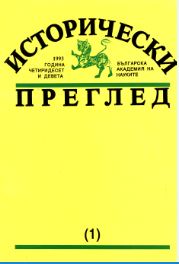Българското национално представителство – идеи и опити за създаването му (40-те – 60-те години на XIX в.)
The Bulgarian National Representation – Ideas and Attempts at Its Establishment (40s – 60s of the 19th c.)
Part One
Author(s): Ognyana Mazhdrakova-ChavdarovaSubject(s): History, Political history, Modern Age, Special Historiographies:, 19th Century, The Ottoman Empire
Published by: Институт за исторически изследвания - Българска академия на науките
Summary/Abstract: During the National Revival the Bulgarian people strove for its spiritual and political liberation and left the acute lack of its own national legitimate representation, recognized by the supreme power in the Ottoman Empire and by the foreign states. The need for such a representative body came to the fore after the Tanzimat reforms had opened certain, though limited, opportunities for lawful activity of the non-Muslim subjects in defence of their proclaimed rights. The new times found the Bulgarians within the boundaries of the Empire with an utterly unfavourable political and legal status, the consequence of the destruction of their statehood and fundamental institutions. In conformity with the Ottoman theocratic order the Bulgarians were incorporated in the Eastern Orthodox religious community – “rum milliyet” – and the head of the Patriarchate of Constantinople and its Grecized high clergy became the only recognized representatives of this community before the Sultan’s authorities. In the context of the historical events a survey is made of how the Bulgarian people as from the beginning of the struggle launched against the Phanariot clergy insisted on doing away with the intermediary functions and secular powers of the Patriarchate of Constantinople and its bishops. In the course of the church conflict the Bulgarians’ desire to win civil and legal independence from them grew stronger. It was expressed in attempts to obtain a permission from the Sublime Porte to set up their own representation of compatriots to defend all the Bulgarians in the Empire. Having once emerged, the idea stimulated numerous demarches and actions of the moderate evolutionist current of the Bulgarian national liberation movement which strove to attain church, administrative and political autonomy. The question of representation was substantiated in the legitimate programme and raised officially before the Sublime Porte in the mid-1840s thanks to the perspicacity and energy of Archimandrite Neophyte Bozveli, Archimandrite Hilarion Makariopolski and Alexander Exarch whose efforts during the next decade were joined by Dr. S.Chomakov, G.Krustevich, T.Bourmov, H.Tupchileshtov, N.Gergov and scores of others. At first was formulated the popular demand for three or four Bulgarians “ephori” and one “kapu-kehaya” to reside in the capital, to put forward the needs of the people and to liaise with the Porte, without the mediation of the Patriarchate of Constantinople. After 1860, when the Bulgarian people proclaimed and effected its complete separation from the administration of the Patriarchate, the idea evolved into the demand of a “Mixed Council” (made up of clergymen and laymen) and later also into a demand of a separate “Lay Council” or “People’s Council”. According to the various projects envisaged by the leaders of the Bulgarian legitimate movement, such a body could eliminate foreign intervention in the church and spiritual life of the people and fulfil the tasks of a representative body of the nation. At the same time it was envisaged for the Council, through administrative structures, subordinated to it, to prepare the ground for Bulgarian autonomy also in civil affairs. To the peaceful pressure for the realization of the legitimate political programme was gradually added the traditional sending of local deputations to the central power by the Bulgarian population even of the most remote parts. Co-ordinated all-national actions, supported by a flow of collective written statements, “mahzars”, were also undertaken. The campaign of petitions, which was periodically renewed, gave grounds to the contemporaries to call that time the “age of mahzars”. In those years emerged also a new form of representation of the Bulgarian people, consisting of elected representatives who acted on a nation-wide level. This representation like the local representatives, was elected without an administrative state sanction. Of it again was characteristic a rotation of its composition and the absence of immunity of the people’s representatives who were often persecuted by both the church and the secular authorities. Notwithstanding the numerous difficulties, the Bulgarian envoys, elected and authorized by the municipalities and bishoprices, gathering in capital, conducted an intensive dialogue with the government and held diplomatic negotiations with the Patriarchate of Constantinople, raised for examination and advanced questions of vital importance that faced their people and defended its interests before foreign diplomats. In this democratic way the Bulgarian society of the National Revival period on several occasions elected its legitimate representatives, a thing which kept up the moral of the people in the prolonged church and national conflict. This representation, although with a provisional mandate, succeeded in publishing its newspapers which popularized the legitimate programme and gave impetus to the struggle for more civil rights and a better political status. The conditions until the end of the 60s, however, did not allow its official regulation and setting up as a special representative body. The Sublime Porte made an exception only with respect to the Bulgarian Uniates who were tolerated by the Western states and for which was established a special Bulgarian Uniate municipality in 1861. It was only when the Porte proceeded with solving the Church question that the demand of such long standing for the right of the Bulgarians to have their legitimate representation was met. With its establishment in 1870 the Bulgarian Exarchate took up its functions in regulating church life. At the same time as the first all-Bulgarian institution in the Empire, it in fact became also the official socio-political representation of the Bulgarian nation that determined itself in its natural ethnic boundaries.
Journal: Исторически преглед
- Issue Year: 1993
- Issue No: 2
- Page Range: 3-35
- Page Count: 33
- Language: Bulgarian
- Content File-PDF

